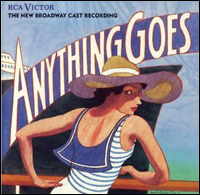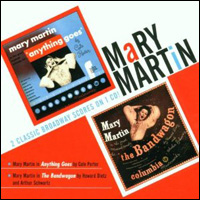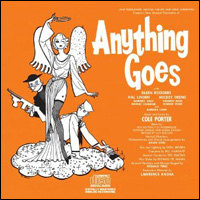
*
The clearcut winner among all the Anything Goes albums that exist is — well, there isn't one. We could start with the authoritative recording of the score, which is — well, there isn't one. This is going to be more complicated than we thought!
All right, let's start at the very beginning. Again, that doesn't work, as Anything Goes opened in the pre-original cast recording days. If we were dealing with something simple, like Oklahoma! or Gypsy, we could just go to the real and authentic original cast album and take it from there. Compounding the enigma is that Cole Porter's 1934 musical hit comes from an era when the shows were not imperishable; the production team of every major Anything Goes revival has revised the book and altered the selection of musical numbers, with full approval of the authors' estates. Will the real Anything Goes please stand up? What is the real Anything Goes, anyway?
Ethel Merman, one of the three stars of the musical in question, recorded her song hits from the show on occasion, but with studio orchestras. There is a full-scale reconstruction of the 1934 version of Anything Goes, but it wasn't recorded until 1988 — when almost everyone involved with the original was long gone. Six selections were recorded by the stars of the 1935 London remounting, which is as close to the original sound as we are likely to get (albeit with Anglicized topical references and a French leading lady). When Goddard Lieberson of Columbia Records started recording scores from pre-original cast musicals, he quickly chose Anything Goes (with Mary Martin) for treatment. It soon became apparent that these early attempts — with contemporary arrangements and little theatrical feeling — were ineffective, so Lieberson and musical director Lehman Engel thenceforth decided to reconstruct the original sound of the scores.
Anything Goes was always a staple of stock, but it gained new life in 1962 when it appeared Off-Broadway in a modified version (with libretto revised by Guy Bolton, one of the original authors). The success of this production launched the show back into wide circulation, albeit with interpolated songs and a small-band arrangement. The resulting recording became the one and only cast album, and for many years that's the Anything Goes we listened to. Until a full quarter-century later, when two things happened.
| |
 |
|
At the same time, musical director/detective John McGlinn — who had just broken new ground, recorded musical theatre-wise, with a full 3-CD set of Show Boat — was hard at work on his own recording of Anything Goes. Working closely with 88-year-old Hans Spialek — co-orchestrator with Russell Bennett of the original production — McGlinn prepared a full reconstruction of the 1934 version and recorded it in 1988. Finally, this was what Anything Goes sounded like! Or was it? And whose Anything Goes was this, anyway? What about the Tony Award-winning revival still packing them in at the Vivian Beaumont?
There are other Anything Goes recordings, naturally, including a 1969 London production (which I believe used the 1962 version), and three remountings of the Lincoln Center version (including 1989 productions in London — starring Elaine Paige — and Australia, and a 2003 London revival). But I needn't include these. Enough is enough.
As you see, we can't really cover this chronologically, because which came first? The only remnant of the 1934 production is a 78 RPM recording by a group that was billed as The Foursome. Original Anything Goes producer Vinton Freedley's prior hit, the 1930 Gershwin musical Girl Crazy, used a quartet of lonesome cowboys as a framing device: they walked around singing and reprising a ditty called "Bidin' My Time." When Anything Goes came along, Freedley presumably instructed the authors — including Bolton, from Girl Crazy — to write The Foursome into the new show. And so Porter gave them a mock sailor's shanty called "There Will Always Be a Lady Fair."
The Foursome — Ray Johnson, Del Porter, Marshall Smith and Dwight Snyder — had recorded "Bidin' My Time," and so they were called into the studio to do the same with "Lady Fair." They accompanied themselves on guitar and ocarina (which is apparently how they performed in the shows, with pit accompaniment). So what we get on the 78 is presumably the precise original cast performance — with vocal arrangement by Johnson — albeit without the orchestra. The flip side contained the boys singing a non-show arrangement of "The Gypsy in Me," a second act beguine originally performed by the ingénue Hope Harcourt. Merman also made two early 78s, with Johnny Green's orchestra. The first, "I Get a Kick Out of You," seems to use an approximation of Bennett's Broadway orchestration for the first half, after which it goes into a studio chart. Merman's other early track, "You're the Top," is presumably a Johnny Green arrangement. There is also a Merman recording of her second act showstopper "Blow, Gabriel, Blow," but this one — with orchestra led by Jay Blackton — was recorded by Decca in December 1947.
The 1935 recordings by the London cast are probably as close to authentic Anything Goes as we'll get. (The London 78s, as well as the early American ones, have appeared on several compilation CDs.) Yes, the Reno of the occasion was French singer Jeanne Aubert, who needless to say sounds quite unlike Merman. Billy Crocker was played by Broadway leading man Jack Whiting, who was more of a traditional musical comedy hero than original star William Gaxton. Gaxton, who started in vaudeville, had starred in Fifty Million Frenchmen for Porter and Of Thee I Sing for Gershwin; while he introduced a slate of hit ballads for the Messrs. Porter, Gershwin and Rodgers, he was foremost a comedian. In fact, Gaxton and his acting partner Victor Moore were the main stars of Anything Goes; Merman, who had made a splash in Girl Crazy, was here elevated to stardom.
Yes, Porter gave Gaxton the Anything Goes love songs, but the actor was already 41 — which in that day and age was extremely old for the love interest. Whiting was in his early 30s, and decidedly more suitable for "All Through the Night." Also represented on the London recordings — singing "Be Like the Bluebird" — is Sydney Howard, who had earlier played the Victor Moore role in the London production of the Gershwins' Funny Face.
| |
 |
|
Next came the 1962 Off-Broadway revival, which was a 239-performance hit at the Orpheum. The orchestration by Julian Stein (of The Fantasticks) is effective, on a necessarily small scale. The resulting cast album [Epic/Sony], being the only one on the market for 25 years, stood in as the Anything Goes record of record. And it's fun. The songs are not quite what Porter had in mind; "Friendship" and "It's De-Lovely," two duets Porter wrote for Merman in later musicals, are inserted along with three pre-Anything Goes show tunes: the well-known "Let's Misbehave" and the lesser-known "Heaven Hop" and "Let's Step Out." (Among the missing are "Lady Fair," "Gypsy in Me," and "Buddie, Beware.")
| |
 |
|
The Lincoln Center cast album [RCA 7769] has Patti LuPone, for beginners, and Howard McGillin too; plus a lively set of orchestrations by Michael Gibson. They even give us Mr. Porter, singing a bit of the title song in the introductory prelude. But once more, this ain't exactly the show that Porter wrote. "Friendship" and "It's De-Lovely" are again present; by now, audiences in general must assume these standards are part of the show. Also added are "Easy to Love" and "Goodbye, Little Dream, Goodbye." "Gypsy in Me" and "Buddie, Beware," which had been excised in 1962, reappeared albeit assigned to different characters.
In theory, John McGlinn's 1988 reconstruction [EMI CDC 7 49848] should be the crowning glory of Anything Goes recordings. The score is all here, including three songs that were cut back in 1934. And no expense was spared in reconstructing the piece. However, this disc loses out in the liveliness sweepstakes. Yeah, I know that 1934 was a different time, with different expectations and musical standards; but could everything have originally sounded so polite and pale? I have just compared McGlinn's tempos with those of the six 1935 recordings, and they are more or less similar (although McGlinn's "All Through the Night" is appreciably slower). Even so, the reconstruction — for all its musical excellence — has something of an academic sound. It is not helped by the performers. Kim Criswell was a McGlinn favorite, yes, but I don't find her Reno compelling. And Cris Groenendaal, the Billy of the occasion, sings purty but without the requisite humor. Jack Gilford is on hand too, as Moonface, but in rather weak voice. (Frederica von Stade, singing Hope, is not in weak voice.)
Ah, if only we had some sense of what these songs sounded like when Gaxton and Merman knocked them over the footlights. Poor Gaxton is almost nonexistent on recordings, which is something of a surprise considering that he starred in ten full-scale Broadway musicals. Happily enough, a radio transcription exists giving us Gaxton singing the verse and first refrain of "You're the Top"; this from a WOR broadcast from Carnegie Hall on March 4, 1935, about three months into the run. And what do we find? That the voice Porter wrote Billy Crocker for was not a romantic baritone but crisply brassy, with pure bravado and a hammy smidgen of "Mammy."
As of this writing, a cast album for the current Roundabout Theatre Company revival of Anything Goes, starring Sutton Foster as Reno and Joel Grey as Moonface, using the Lincoln Center script and score, has not been announced.
(Steven Suskin is author of the recently released updated and expanded Fourth Edition of "Show Tunes" as well as "The Sound of Broadway Music: A Book of Orchestrators and Orchestrations," "Second Act Trouble" and the "Opening Night on Broadway" books. He also pens Playbill.com's Book Shelf and DVD Shelf columns. He can be reached at [email protected].)
*
Visit PlaybillStore.com to view theatre-related recordings for sale.










